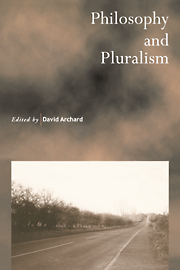Book contents
- Frontmatter
- Contents
- Notes on Contributors
- Introduction
- Philosophy in Different Cultural Contexts
- A Case for Philosophical Pluralism: The Problem of Intentionality
- William James, ‘A Certain Blindness’ and an Uncertain Pluralism
- Cultural Realism: the ancient philosophical background
- Religion and Pluralism
- A Single True Morality? The Challenge of Relativism
- Pluralism, Realism and Truth
- Value-Pluralism
- Moral Philosophy and its Anti-pluralist Bias
- Coping with the Many-Coloured Dome: Pluralism and Practical Reason
- Rawlsians, Pluralists, and Cosmopolitans
- Political Liberalism, Secular Republicanism: two answers to the challenges of pluralism
- ‘Race’ in Britain and the Politics of Difference
- Tragedy, Moral Conflict, and Liberalism
- References
William James, ‘A Certain Blindness’ and an Uncertain Pluralism
Published online by Cambridge University Press: 30 October 2009
- Frontmatter
- Contents
- Notes on Contributors
- Introduction
- Philosophy in Different Cultural Contexts
- A Case for Philosophical Pluralism: The Problem of Intentionality
- William James, ‘A Certain Blindness’ and an Uncertain Pluralism
- Cultural Realism: the ancient philosophical background
- Religion and Pluralism
- A Single True Morality? The Challenge of Relativism
- Pluralism, Realism and Truth
- Value-Pluralism
- Moral Philosophy and its Anti-pluralist Bias
- Coping with the Many-Coloured Dome: Pluralism and Practical Reason
- Rawlsians, Pluralists, and Cosmopolitans
- Political Liberalism, Secular Republicanism: two answers to the challenges of pluralism
- ‘Race’ in Britain and the Politics of Difference
- Tragedy, Moral Conflict, and Liberalism
- References
Summary
‘Pluralism’ may be an ambiguous term. But it is not the multitude of the word's meanings but the multitude of sorts of thing that ‘pluralists’ might be claiming to be not-single-but-plural that generates unclarity about what any ‘pluralist’ position amounts to. Take ethics: a ‘pluralist’ might be maintaining, as against say an ethical hedonist of a Benthamite sort, that there is more than one sort of thing ‘good in itself’. Another ‘pluralist’ might maintain that there is more than one sort of life that counts as a ‘good way of life’. Or that not all moral duties are forms of the duty to be truthful. Or that there is more than one framework in terms of which experiences, actions or lives can properly be assessed. There is a problem in understanding what it is that is supposed to be counted: one-or-many of what? While the value today of William James's popular essays in what we might now call ‘value pluralism’ far exceeds their role in illustrating this difficulty, they do exemplify it. James of course described himself as a ‘pluralist’; he was on the flagship of that movement. But just to what extent and in what respects remains unclear.
Richard Rorty (1989, p. 38) has brought to contemporary attention James' ‘On a Certain Blindness in Human Beings’ (in James, 1917a, pp. 229ff).
- Type
- Chapter
- Information
- Philosophy and Pluralism , pp. 33 - 46Publisher: Cambridge University PressPrint publication year: 1996
- 1
- Cited by

